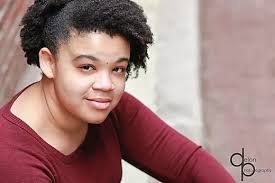
Florestal, image from www.pascaleflorestal.com
Profile by Kitty Drexel
BOSTON/ZOOM — Boston’s theatre journalism scene is a barren wasteland of white maleness. The desperate cries of BIPOC performing artists and designers for accurate representation are carried by winds off of the Atlantic ocean to diversity-parched cities and towns across New England: where are the critics of color?
Critiquing and reviewing circles have remained steadfastly white for the last few decades. Out of the current eleven members of the Boston Theater Critics Association, six are white men, five are white women.
The Front Porch Arts Collective launched the Young Critics Program in spring 2019 in partnership with WBUR the ARTery. It is the only independent training opportunity specifically geared towards young BIPOC journalists in New England. Boston-based director, dramaturg, educator, writer, and collaborator Pascale Florestal is the woman in charge.
Florestal describes herself as having strong Haitian pride on her website. She hopes to create more opportunities for other queer artists of color. She resides in Malden with her wife and dog.
We met over Google Meet on a sweltering, 98-degree day in late July to discuss her work with the Young Critics Program. While I was visibly sweating in my dank apartment, the camera showed Florestal looking as cool as a cucumber in a grey tank top and glasses against a cornflower blue wall.
Florestal is young; there are no laugh lines around her eyes. Her warm smile does not betray her age (and a lady doesn’t ask). She has a pert nose and a broad smile. Her short, natural hair is a halo around her head.
Her skin and her voice were clear as the cloudless sky. She spoke with such passion about her work that it was as if she was channeling the extreme weather into her words.
“A couple of years ago I was reading some reviews for a show and I happened to notice that all of the reviewers for this particular show were white men,” Florestal said.
She went on a hunt for reviewers of color but couldn’t find any in Boston. From there, she looked into what kind of opportunities there were for young people to learn about being a critic and came up empty.
The purpose of Florestal’s program is to provide young people of color opportunities to see more theatre, understand the importance of criticism, and learn to write a review of a show. “On top of this, we want publications and organizations to see value in employing young writers and writers of color.”
In 2019, Florestal co-wrote a public internet letter with other members of the Boston performing arts community to the committee of the Independent Reviewers of New England to argue for better representation in awards categories. The nominees that year and every year previous skewed male, white, abled, and cis.
In the letter, co-signing New England performers, administrators, designers, stage managers, and artists said, “We would like to see your reviews and awards more appropriately and respectfully reflect a broader scope of the work being done in the greater Boston area. We are asking you to reassess your reviewing processes and consider adapting to the community you aspire to represent.”
“We were moved to write a letter at this time because this season’s IRNE awards failed to adequately acknowledge the contributions of women and people of color,” it said. The writers and signers included a helpful list of action items for consideration to update the IRNE’s practices.
The IRNE board responded to the letter by disbanding after 23 years of work. A WBUR article quoted IRNE representative Mike Hoban as saying that the letter wasn’t the reason the committee disbanded. Regardless of intent, to the casual observer, it looked like the IRNE reviewers quit in a tantrum because they felt underappreciated. They were so averse to receiving constructive criticism that they preferred cessation of the awards over professional growth.
How hypocritical.
The inaugural cohort of the Young Critics Program was hard at work when COVID-19 forced Florestal to end the program abruptly in March: some of the young critics were quarantining outside of Boston; theatres were shutting down their operations; the city was closing. Workshops were conducted virtually but the pandemic’s financial crisis made it difficult for the program’s partners to continue. The barren wasteland of male whiteness was becoming a reality truer than science fiction.
I asked her if there were any future plans for the program. She said they are currently trying to figure out what the next year’s program will look like. She is in the process of figuring out an online option and looking at ways to improve upon the program’s structure from before the shutdown. She hopes that they can start again in the spring.
It’s a matter of reformatting the program through a virtual lens, she said. “And preparing for the future so when these things happen there isn’t so much of a kerfuffle.”
When I mention the pushback Florestal experiences from her senior contemporaries, she said that there is a misconception that young people don’t understand the issues the theatre is facing because they are young.
She’s not just talking about herself. She’s talking about all young people.
Talk like that devalues the work young people do in the community; it diminishes the experiences and traumas that they bring to the work, she said. Young people are making theatre sustainable; they are the ones carrying it into the future.
Regarding the reviewers and critics who don’t value the perspectives of young people, she said, “I feel bad for them.”
I do too.
